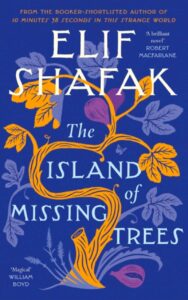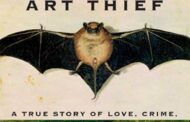Book Short
‘The Island of Missing Trees’
by Elif Shafak
Review by Stephanie Miller

Do the trees, flora, and insects of Cyprus have anything to teach citizens torn apart by civil war and colonialism? The answer is a resounding yes – despite most of the people’s refusal to listen – in this fantastic and mystical novel by the prolific and politically astute Elif Shafak, “The Island of Missing Trees.”
Two young lovers – one Greek, one Turkish – meet in secret in a taverna where a fig tree grows through a cavity in the roof. Not only different ethnicities, but they are also different religions. Neither family would support even a friendship with “the other.” Through their surreptitious relationship and eventual discovery and separation by his mother, the novel covers a generation of Greek and Turkish neighbors who move from mutual animosity to secret terrorism to outright war, in the process reducing much of the island to ashes, rubble, and graveyards.
Exhausted, those still alive emerge like sleepwalkers into the war’s oppressive aftermath. Separated over many years and by widely different experiences, the lovers meet again.
In London, a fig tree grows in the backyard of the house where teenaged Ada Kazantzakis lives. It is the only connection she has to Cyprus, an island she has never visited and the relatives she has never known. Especially since her mother’s death, she suspects the never discussed and troubled history of her parents and why their families never visit is a clue to discovering her own identity. Sometimes she suspects that her father loves the fig tree more than his family. When her mother’s long estranged sister shows up, Ada is angry at first, but then realizes her aunt may be her first good chance to learn something of the mysterious past.
A Unique – and Wise – Narrator
In a stroke of brilliant mysticism, the fig tree narrates much of the story, providing a kind of ombudsman view from the perspective of a wise, all-seeing elder. Trees live a lot longer than humans, and the fig tree is a witness often avuncular and amused by humans’ ability to love and honor each other. Also, the tree is frequently horrified at the human capacity for murder and destruction.
Shafak weaves a beautiful story about love and tragedy in many forms, illustrating how connected we are not just to each other, but to nature. “The Island of Missing Trees” is heartbreaking and tragic, but also hopeful. It is a tribute to the troubled but impassioned history of Cyprus. After discovering her work here, I immediately bought several other of her novels, and recommend “The Forty Rules of Love” as well.
Micro Shorts
‘The Making of Another Major Motion Picture Masterpiece,’ by Tom Hanks.
Actor Tom Hanks is a bit in love with the making of a movie, and his latest novel (out in hardback only) is a tribute to all the “little people” who work endlessly and expertly to bring a movie to the screen. It’s a long book, full of anecdotes and delightful characters, but not much happens. A determined reader has to be really into the details of how the coffee is made on set (literally). Still, I get the sense that Hanks is honoring colleagues he’s worked with over the years. The novel is truly a tribute to the many people who come together to create what eventually graces the screen, and to the intense and diverse work required to shoot a film.
‘Your Type of People,’ by Victoria Yang
I picked up this slim novel by 19-year-old Yang at The Telling Room’s annual Show and Tell event. The light tone and summer camp setting belie the deep and troubling emotional entanglements incited by handsome, young, aspiring novelist David Fang. For a first effort by a young writer, it’s reasonably cohesive, although relying on an epilogue to put some of the bits in order. It’s always worth visiting the Telling Room’s online store to support this amazing program that helps young writers from all kinds of socio-economic backgrounds hone their storytelling craft.
‘The Little Drummer Girl,’ by John le Carré
This is an oldie but goodie that is worth picking up again. It’s one of his novels that departs from agent George Smiley. Set amidst the Israel-Palestine conflict, it has all the hallmarks of le Carre’s genius: dark, smoldering, stoic spies, international intrigue, complicated plot lines, and characters you are repulsed and fascinated by in equal measure.





